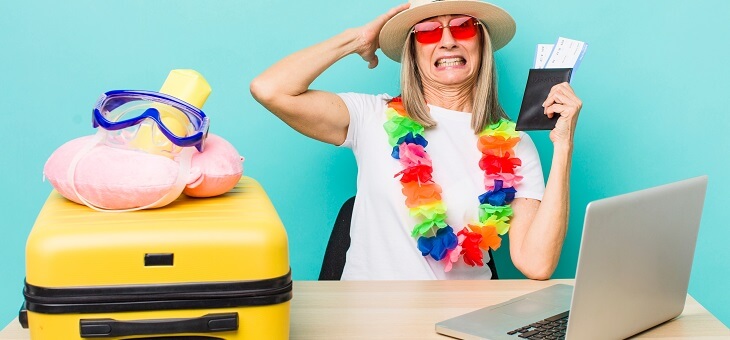Life never goes smoothly, and holidays certainly don’t.
You are often out of your comfort zone, without your normal resources and a long way from home. If things go wrong, often it’s not as simple as taking a deep breath and changing tack. Problems on holiday can quickly spiral out of control.
Here’s our guide to six common travel problems and how to solve them.
Being unprepared
Gone are the days of simply booking flights and accommodation, and away you go.
The pandemic has changed the landscape around travel, so it pays to do your research.
Read: Five places around Britain best explored by bike
What shots will you need? Will you need face masks? Are there any travel restrictions? Or are there likely to be, as some countries try to cope with rising COVID cases?
The government’s smarttraveller.gov.au site is a good place to start, as it maintains travel advice for more than 170 destinations.
It also provides advice on visas, exit requirements from Australia including how to get an international COVID vaccination certificate, travel insurance advice and what medications are legal and available in the countries you are going to. It’s veritable travelling gold mine, and every overseas traveller should subscribe to it.
Read: We debunk the common travel myth about the brace position
Jet lag
I tip my hat to people who don’t suffer jet lag, because at the end of a long journey I generally feel like I have been strained through a sock.
It’s tempting to resort to medication. I know a doctor who takes sleeping tablets, slaps a ‘do not disturb’ sticker on his eye mask and then wakes up on time to accept a cup of coffee before he lands, which frankly sounds perfect but for the rest of us without a ready supply of drugs, here are some tips.
- Get plenty of rest beforehand. Starting out sleep deprived makes it worse.
- Adjust your schedule if you can. Try to match, or get as close to matching, the time zone you are travelling to by moving the time you go to sleep and wake up for a few days before you travel.
- Set your watch to the new schedule while in the air and try to match meals to the local time as soon as possible when you land.
- Sleep on the plane, if possible. This will give you a reserve of energy to deal with anything that comes your way.
- Stay hydrated. Travel saps the body of moisture, so to feel your best make sure you have plenty of water at all stages of your journey.
Travel sickness
This one can ruin a holiday in minutes and take hours to fade. Unfortunately, if you suffer from it you can’t cure it completely, but there are a few tips to help ease the distress.
- Lessen the chances of motion. Sit on the middle of the boat, front seat of the car or above the wings in a plane and try and look at a fixed point such as the horizon.
- Take deep breaths of fresh air, although don’t try this on a plane as this is a fast way to get yourself into the news.
- There are plenty of effective over-the-counter medications. It might take a few to get it right, but it’s worth experimenting.
Insect bites
Insects are the most populous things on the earth and many of them see us as a slow-moving feast. Hopefully, you’ve had all your shots, but that doesn’t stop them from biting you in the first place.
A bite may be inconvenient or, at the other end of the scale, land you in hospital.
Pack plenty, and then some more insect repellent and reapply frequently if you are sweating.
If it’s a place known for insects – Uluru I’m looking at you – then long sleeves and pants, and a hat with a veil are a must.
Read: Here’s what booze actually does to your body in the air
Heat exhaustion or sunstroke
We like to think we are tough Australians and heat doesn’t bother us, but even the hardiest wilts under a long, hot day.
First rule of avoiding heatstroke is to stay out of the sun. I get it, we want to enjoy all the holiday we can, but maybe take it easy in the hottest part of the day.
Drink plenty of water, lie down if you feel a bit weird and cool yourself down by spraying or wiping yourself with water.
Food poisoning
There is nothing my body likes better than a good dose of food poisoning while overseas. And talking among my friends it seems I’m not alone.
The simplest ways to avoid food poisoning are to practise basic hygiene by washing your hands regularly and avoid any foods that are not piping hot.
Seems simple, but everyone knows sometimes it’s unavoidable so pack plenty of diarrhoea medication as well as painkillers and, if possible, electrolyte drinks and get plenty of rest.
Consult a doctor if it lasts longer than a few days.
If you enjoy our content, don’t keep it to yourself. Share our free eNews with your friends and encourage them to sign up.

